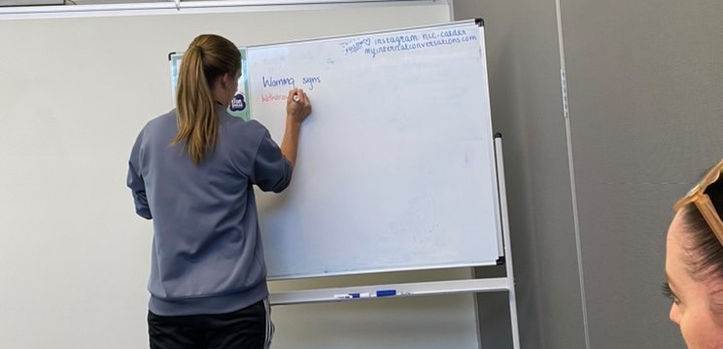nicole calder
mental health training
not sure how to respond to someone who’s struggling? afraid of saying the wrong thing? have a friend who has an eating disorder or is suicidal? through my work as a crisis text line counsellor, the current mental health first aid training, and my own lived experiences, i’ve devised a training program to help equip individuals with skills to navigate some of these challenging conversations. the training is composed in an easily digestible 2 x 2 hour module format with flexibility to accommodate other time parameters.
as i mentioned in my about me, i believe that a lot of mental health focuses on the individual struggling and places the responsibility on the individual to help make themselves better. but when have we ever gotten better alone? how much easier is it to talk about our struggles when someone first makes us feel safe? safe in the form of non-judgment, non-reaction, and taking an active interest in our lives. at the end of the day, i can be the world’s best communicator and talk about my problems all day long, but if the person i’m talking to doesn’t know how to respond, that will determine whether i feel better or worse. so why not focus on equipping individuals with skills to respond better? and that’s exactly what this training is designed to do.
the first module is focused on teaching individuals how to become a safe environment - how to build rapport, the five good contact techniques, how to collaboratively problem solve and things to avoid saying and why. module two is more mental health specific – it focuses on how to risk assess someone who’s suicidal, the warning signs of someone who’s suicidal, how to support someone with an eating disorder, someone who’s self-harming, someone who is struggling with addiction, and someone who has been abused.
once individuals have completed the training, they will become part of the empathy mvp (most valuable people) community in which individuals support those who are supporting others. the fact that 80% of individuals who end up taking their life communicated to someone that they were intending to do so within two weeks suggests the problem is not in individuals communicating their struggles – it’s in those comprehending and supporting them. this training will help you feel more confident in doing the latter.
so if this is something you or your organisation is interested in, please contact me to see how i can make the training work for you.







